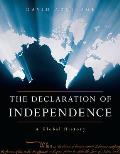“More than ever, historians must write to the present”
The Royal Historical Society’s Historical Transactions website recently shared David Armitage’s essay “The Impulse of the Present,” on “the value of presentist thinking for historical debate.”
Like politicians deploying the term “revisionist,” historians use “presentist” as a pejorative label for historical arguments that grate on them. But exactly what the problem is can vary from one observer to another. “Whatever presentism is,” Armitage writes, “historians generally agree on one thing: that they’re against it.”
Of course, one person’s presentism is another’s perspective, and changing perspective often leads to insights. Most people reading history, professional or not, can spot the folly of imposing one’s own understandings or outlook on people of the past. But historians use “presentist” to criticize other approaches, sometimes including being overly motivated to study certain questions because of current concerns—even if the study itself is rigorous.
Armitage rejects that, writing:
Armitage is the Lloyd C. Blankfein Professor of History at Harvard University. He has more to say in his chapter “In Defence of Presentism” in History and Human Flourishing, edited by Darrin McMahon and published by Oxford University Press this year. Among his several previous books is The Declaration of Independence: A Global History.
Like politicians deploying the term “revisionist,” historians use “presentist” as a pejorative label for historical arguments that grate on them. But exactly what the problem is can vary from one observer to another. “Whatever presentism is,” Armitage writes, “historians generally agree on one thing: that they’re against it.”
Of course, one person’s presentism is another’s perspective, and changing perspective often leads to insights. Most people reading history, professional or not, can spot the folly of imposing one’s own understandings or outlook on people of the past. But historians use “presentist” to criticize other approaches, sometimes including being overly motivated to study certain questions because of current concerns—even if the study itself is rigorous.
Armitage rejects that, writing:
More than ever, historians must write to the present because people in that present demand accounting for the past and, by necessity, want historical answers to contemporary questions. ‘Like funerals, history-writing is for the living,’ remarks the historian of science Hasok Chang.My take on “presentism” has long been that it’s inescapable, so we should acknowledge our perspective from this time while doing what we can to understand how people of the past viewed the world. I take comfort in F. Scott Fitzgerald’s statement, “the test of a first-rate intelligence is the ability to hold two opposed ideas in the mind at the same time, and still retain the ability to function.”
That aphorism is one among many signs that historians of science are ahead of most other historians in the sophistication and pragmatism of their attitude towards presentism. For example, my Harvard colleague Naomi Oreskes (‘Why I am a Presentist’) and the French historian of biology Laurent Loison (‘Forms of Presentism in the History of Science‘) have recently argued for what they variously call substantive, empirical, critical and motivational presentisms.
Substantive presentism assumes continuities between past and present that make at least some elements of the present usable as keys to unlock the past; this in turn empowers empirical presentism where, say, current scientific understandings of the aetiology of bubonic plague allow historians to analyse past epidemics using knowledge unavailable to past actors.
Critical presentism reverses the arrows of Whig history—’Tory’ history, perhaps?—by deploying historians’ sense of the complexity and contingency of the past to dethrone the pretensions of the present. This may dampen dogmatism by admitting all flesh is grass and this, too, shall pass.
Finally, what Oreskes has dubbed motivational presentism is the admission that how we choose our historical questions, as well as how we answer them, are far from innocent or disinterested acts: ‘What matters to us about the past,’ Oreskes argues, ‘has everything to do with who we are, where we live, and what we think is important—to us, here and now, in the present.’ Such frankness about our own motivations will not only allow historians to scrutinise our motivations more closely: it can equip us with more empathy for the swelling publics who demand understanding and accountability for past injustices.
Armitage is the Lloyd C. Blankfein Professor of History at Harvard University. He has more to say in his chapter “In Defence of Presentism” in History and Human Flourishing, edited by Darrin McMahon and published by Oxford University Press this year. Among his several previous books is The Declaration of Independence: A Global History.


No comments:
Post a Comment